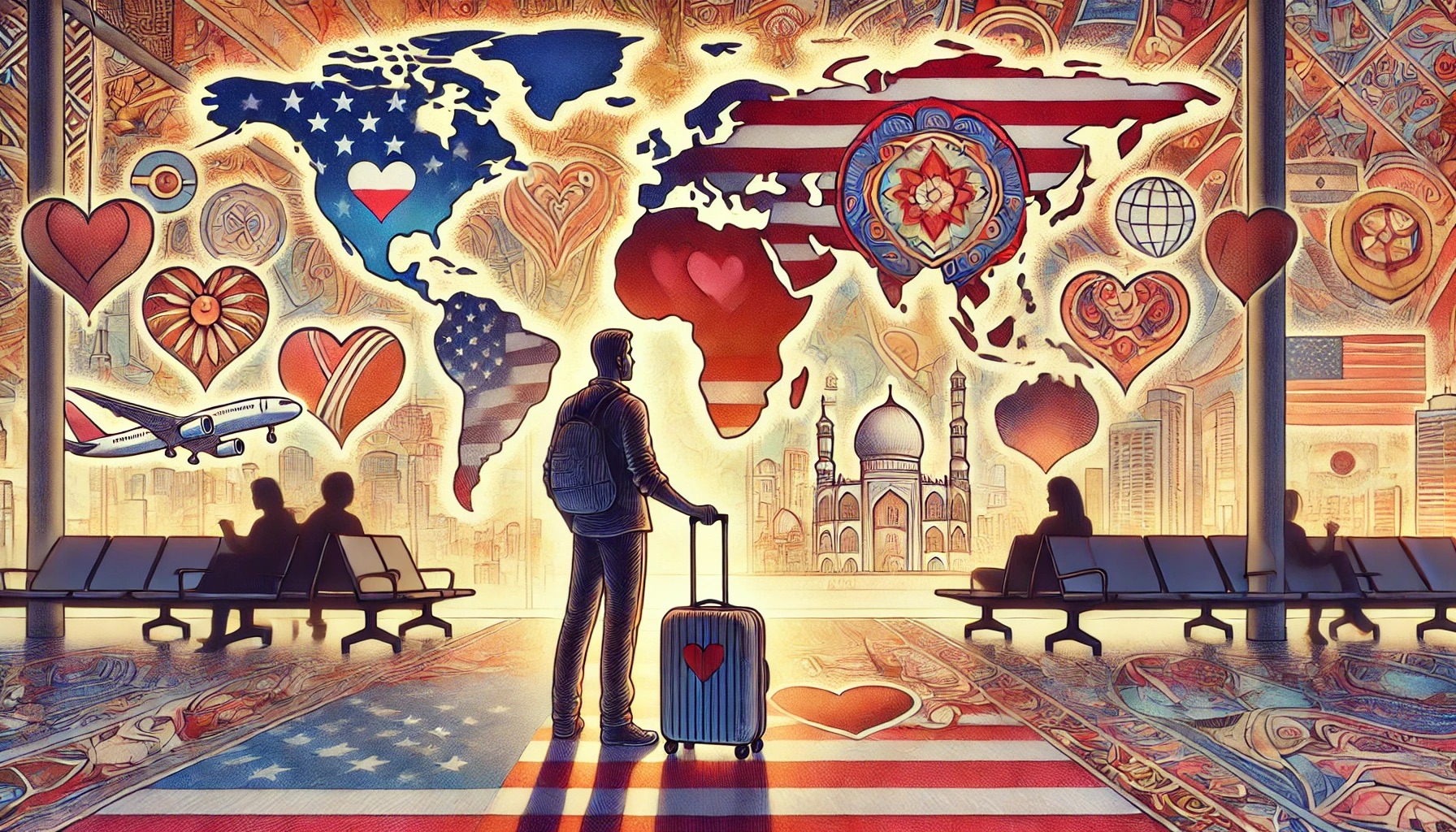Why American Men Are Opting Out of Dating at Home and Searching for Love Abroad
In recent years, a noticeable shift has emerged among American men who are increasingly choosing to look for love beyond the borders of the United States. Dubbed the “Passport Bros” movement by some and criticized as escapism by others, this trend has sparked heated debates across social and cultural lines. At its core, the phenomenon reflects discontent with domestic dating dynamics and the pursuit of alternative relationship models abroad. To understand this growing trend, we need to delve into the cultural, economic, and personal factors driving it, as well as the implications for relationships in an increasingly globalized world.
The Changing Landscape of Dating in America
The dating culture in the United States has undergone dramatic shifts in the past few decades. Factors like the rise of dating apps, the changing dynamics of gender roles, and evolving expectations in romantic relationships have created a complex and often challenging environment for singles.
Cultural Evolution and Gender Roles
The modern dating scene is influenced by the redefinition of gender roles and the prioritization of personal independence. As more American women focus on their careers, education, and personal goals, traditional relationship milestones like marriage and starting a family have been delayed. While this shift reflects empowerment and progress, some men interpret it as a departure from traditional values, making it difficult to find partners who align with their expectations.
Furthermore, the widespread adoption of feminist ideals has led to what some men perceive as heightened scrutiny of their roles in relationships. Many express frustration with societal pressures that demand they fulfill traditional provider roles while simultaneously navigating evolving expectations around equality and emotional labor.
The Rise of Casual Dating and “Hookup Culture”
Casual dating and hookup culture, often facilitated by apps like Tinder and Bumble, dominate the American dating landscape. While this appeals to some, many men seeking long-term commitment report difficulty finding partners with similar intentions. They cite concerns over superficiality and a lack of emotional depth in interactions mediated by swiping-based platforms. The perception that meaningful connections are increasingly rare drives some to explore alternative dating options abroad.
Why Some Men Look Abroad for Love
Perceived Traditional Values in Foreign Cultures
A common theme among American men seeking partners overseas is the belief that women in other countries adhere more closely to traditional values centered around family, respect, and long-term commitment. Many describe foreign women as less “career-driven” and more inclined to prioritize relationships and domestic harmony.
Countries in Southeast Asia, Eastern Europe, and Latin America often emerge as popular destinations for these men. In these regions, cultural norms may place a higher emphasis on familial and communal bonds, aligning with the preferences of men who feel disconnected from the American dating ethos.
A Desire for Simplicity in Relationships
Men opting for international relationships often describe these partnerships as simpler and less fraught with the tensions of Western dating. They perceive foreign women as more approachable and less influenced by what they see as American dating’s emphasis on status, income, or hyper-individualism. These perceptions, however, may oversimplify the realities of cross-cultural relationships and reflect an idealized view of other cultures.
Economic Disparities and the Appeal of Stability
The economic element cannot be ignored. In many countries, American men find that their financial standing provides access to a higher quality of life. A mid-level income in the United States can translate to substantial affluence in countries with lower costs of living. This economic advantage may make dating and forming relationships abroad more appealing, particularly in regions where financial stability is highly valued in partnerships.
Technological Advancements and the Global Dating Pool
The Role of Dating Apps and Social Media
Technology has played a crucial role in facilitating this global dating trend. Platforms like Tinder, Bumble, and even niche apps tailored to international dating allow American men to connect with women across the globe. Social media, too, has expanded awareness of global cultures and introduced men to the possibility of cross-border romance.
Online communities and forums, such as those on Reddit or specialized Facebook groups, further amplify this trend. These platforms serve as hubs for men to share experiences, exchange advice, and even organize trips to meet potential partners abroad.
The Influence of Travel Culture
The increasing affordability and accessibility of international travel have also fueled this movement. Men who travel for leisure or work often discover opportunities to form connections in other countries. Some return home disillusioned with the American dating scene and inspired to pursue long-term relationships overseas.
The Criticisms and Controversies
Reinforcement of Stereotypes
Critics argue that the “Passport Bros” phenomenon perpetuates stereotypes of foreign women as submissive, dependent, or less assertive than their American counterparts. These portrayals risk dehumanizing women from other cultures and reducing them to caricatures that serve male fantasies of traditionalism.
Conversely, American women have criticized the trend as an attempt by some men to avoid the challenges of building equitable partnerships. They argue that seeking relationships abroad may reflect a desire for control or an inability to adapt to changing norms.
Power Imbalances
Cross-cultural relationships often involve inherent power dynamics, particularly when economic disparities are significant. The financial advantage enjoyed by many American men in lower-income countries can create an unequal playing field, raising concerns about exploitation or coercion.
Cultural Misunderstandings
Building a successful relationship across cultural boundaries requires mutual understanding, respect, and effort. Critics caution that men entering such relationships may underestimate the complexities involved, from language barriers to differing social expectations. These challenges can lead to misunderstandings and unmet expectations, ultimately jeopardizing the longevity of these unions.
The Global Response
Changing Attitudes Toward Western Men
In many countries, Western men are seen as desirable partners due to their perceived stability, financial security, and openness to cross-cultural relationships. However, this dynamic is not without its critics. Activists in some regions have called for greater scrutiny of relationships involving significant age or economic disparities, citing the potential for exploitation.
Increased Popularity of Cross-Cultural Marriages
Despite controversies, cross-cultural marriages continue to grow in popularity. These unions are celebrated for fostering understanding and bridging cultural divides. Success stories often highlight the enrichment that comes from blending traditions and perspectives.
What This Trend Reveals About Modern Dating
A Reflection of Globalization
The movement of American men seeking love abroad underscores the interconnectedness of today’s world. Globalization has dissolved many barriers to forming international relationships, allowing individuals to explore a wider range of options in their search for companionship.
A Response to Societal Frustrations
At its core, this trend reflects a dissatisfaction with certain aspects of American dating culture. Whether driven by frustration with modern gender dynamics, disillusionment with hookup culture, or the pursuit of perceived traditionalism, these men are responding to cultural shifts in their own way.
A Challenge to Traditional Boundaries
The increasing prevalence of international relationships challenges conventional notions of romance, partnership, and belonging. These unions push the boundaries of what is possible in an era where technology and travel redefine human connections.
Conclusion: Beyond the Passport
The growing trend of American men seeking love abroad reveals much about the complexities of modern dating. It highlights the tensions between tradition and progress, individualism and community, and cultural specificity and globalization. While this phenomenon is not without its criticisms, it reflects a genuine attempt by many to find meaningful connections in an ever-changing world.
As this movement continues to evolve, it will undoubtedly spark further discussions about love, culture, and the future of relationships. Whether it leads to greater understanding or entrenches existing divides, the choice to cross borders in search of love is a deeply personal one—shaped by the unique experiences and aspirations of each individual.



